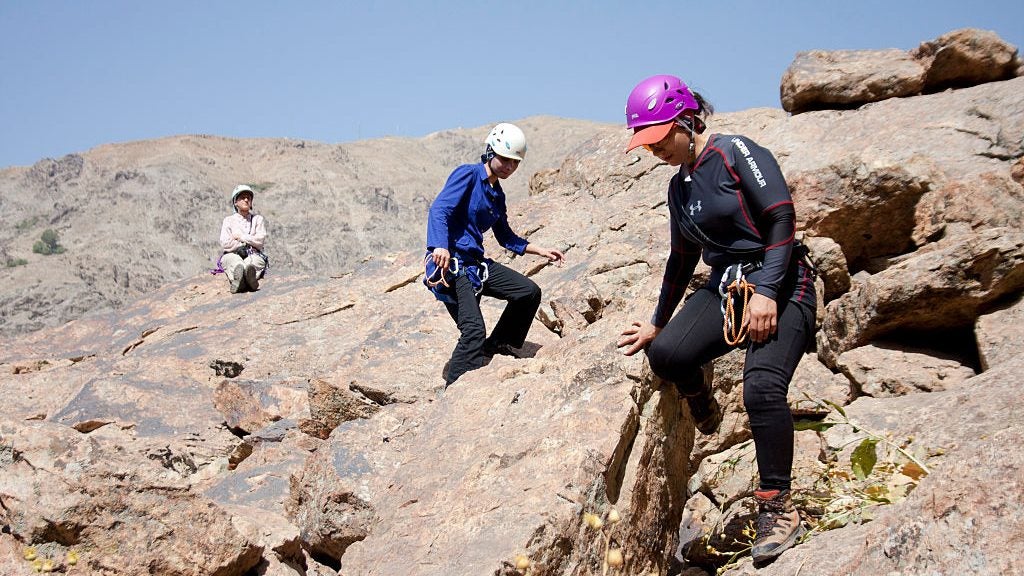Iran Banned Women From This Climbing Area. They're Not Having it.

Women climbing near Tehran, Iran, in 2014. (Photo: Sobhan Farajvan/NurPhoto)
Women are now banned from climbing outside in Dorche, a city in Isfahan, Iran, following an incident at the local mountain Kooh Sefid.
The Kooh Sefid climbing area has more than 40 sport routes. Because it is at the top of the mountain with little traffic beyond climbers, men and women have historically climbed together there freely, a climber from Iran told Climbing. The climber asked not to be identified for fear of retaliation.
On February 22, a group of men and women were attending a canyoning class there—but much closer to the village—when they were interrupted by a local Islamic fundamental extremist. “The climbers were interrupted while climbing and beaten up after they objected to the interrupters,” the Iranian climber said.
Dorche, a small city in Isfahan, has a population of roughly 50,000. Much of the population is traditional and has strict religious beliefs, Farnaz Esmaeilzadeh, one of the leading Iranian competition climbers, explained to Climbing via email. “As far as I heard, women are less engaged in sports or social activities in Dorche,” Esmaeilzadeh said. “So probably it’s strange for men to see women coming from Isfahan and doing sports such as rock climbing or canyoning.”
According to IranWire, the Isfahan Mountaineering Board released a statement condemning the attack and offered legal assistance to the Iranian climbers affected by the incident. Following the Board’s statement, the Imam of the grand mosque of Dorche made remarks in Friday prayers in support of the attacker. The Imam said that the male and female climbers were doing “dirty works” by traveling together in a car to get to the climbing site, the Iranian climber said.
“In his speech, the Imam mentioned the incident and praised those who interrupted the climbing practice and threatened Isfahan’s Sport authorities not to mess with Islamic culture of the regime,” the climber said. “He claimed that rock climbing is certainly different from mountain climbing and it was disgusting and against Islam.”
In response, Mehdi Nasr Esfahani, head of the Isfahan Mountaineering Board, banned outdoor climbing for women in Dorche. The Dorche site is particularly sensitive because it is near the Cultural Center and the Tomb of the Unknown Martyrs, said Esfahani, and it is a pilgrimage site for local people. He also said that the Mountaineering Board is looking to meet with the Dorche Imam, the governor of Khomeini Shahr, and others in charge in order to discuss building a new access route to the site for women.
In the meantime, women climbers in Dorche have been relegated to climbing only in gyms “It is strange that instead of addressing the essence of the issue, women are advised not to climb in that site and temporarily climb only in the gym, which is unfair and nonsense,” Esmaeilzadeh said.
The Isfahan Imam has previously criticized women for climbing at the Dorche site and for climbing with men, Iran International reported. Climbers have also been insulted near Dorche and asked to leave the area a number of times before this most recent altercation. The climbing community complained about these incidents at the time, but nothing has changed.
But this time, part of the incident was captured on film, and others are chiming in in solidarity. One Iranian tweeted, “Why don’t they kill girls as soon as they are born? Women in Iran are not allowed to travel abroad without their husband’s permission. Riding bicycles and climbing rocks are also banned.” (In Isfahan, women riding bicycles has been a contentious issue in the past. Police would take women’s bikes if they resisted the ban against biking, RadioFreeEurope/RadioLiberty reported.)
Imams making statements that limit women’s rights and freedoms is nothing new. In 2006, when women were about to gain entry to football stadiums, Senior Cleric Ahmad Khatami spoke against it during the Tehran Friday prayers. There could be no way to guarantee women would observe “Islamic decency” in stadiums while they watch sports, he claimed. The Friday prayer Imam of Varamin, Mehdi Ghoreishi, said that the effort to open stadiums to women was “the highest insult to the women of the Islamic society.”
And for women climbers elsewhere in Iran, obstacles are nothing new either. Women face restrictions such as not being allowed to have a male coach, limited gym time, and fewer resources than male athletes.
“As far as I know, what happened in Isfahan was a problem with locals in that specific climbing spot, since that sight is very close to the tomb of the Unknown Martyrs, and the ban for climbing in that area is temporary,” wrote Esmaeilzadeh. “But women’s rights in Iran is different from what we are talking about here. I believe that cultural and traditional matters should not impact women’s sport activities in general.”
According to a 2020 fact sheet published by the Center for Human Rights in Iran, Women in Iran cannot travel outside the country without their husband’s permission, girls can be married at 13, and violence by family members is considered a “family matter.” Women are required to cover their hair and body in public; every year, police stop millions of women and fine tens of thousands for an “improper hijab.” If a woman peacefully protests the mandatory veil, she could be sentenced to up to ten years in prison.